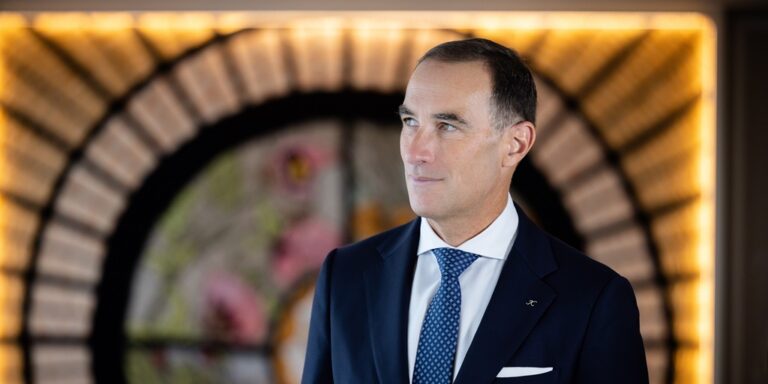Evens Charles sat down with THP News to discuss his company’s ongoing partnerships with major groups, Marriott International and Hilton Worldwide.
Covid change
He revealed that the pandemic prompted a change in strategy for the developer, detailing: “Covid decimated our industry from having 70-80% occupancy in our hotels to 10% in some instances. We had to close a couple of hotels. That was so eye-opening that we decided to be a bit more diverse and not have all of our eggs just in hospitality, so if something were to happen like this in the future we wouldn’t be exposed to one asset class.”
Therefore, he outlined: “We’re now focused on more mixed-use developments that still include a hotel component but would also have multi-family elements. Within multi-family we like the affordable space so that’s a vertical that we’re looking to develop.”
Public private partnerships
Being located in the USA’s capital city means that Frontier is in prime position to reach out to governmental departments. Charles explained: “We started pursuing some public private deals here in DC and our mayor Muriel Bowser put out a request for proposal (RFP) about a year and a half ago.
“We were fortunate to be awarded a project, Hill East, which is near the Capitol. That’s going to be a $564 million project across 1.2 million sq ft where we’re going to be delivering 1,100 apartments, one third of which will be affordable, and we’re looking to build a 150-key Residence Inn extended stay hotel. We still have our fingers crossed that the Washington Commanders [American football team] come back to their old stadium because that is literally across the street from where we’re building the Residence Inn.”
Phase one of the project will see the construction of two apartment buildings and a retail component on the ground floor, while phase two will involve another two apartment buildings and the hotel. The design will be finalised this year with permits hopefully obtained by 2024 and groundbreaking taking place in Q2 that year.
Frontier also has other RFPs awaiting project award decisions in the DC metro area too.
Illinois-bound
The developer’s latest project is the acquisition of Chicago Marriott Suites Downers Grove, located in Downers Grove, Illinois, along with its partners Sun Development & Management Cooperation and 3H Group.
The process started towards the end of 2021, with the acquisition finally confirmed in October 2022. Charles revealed: “It was part of a three pack portfolio and we decided to pursue the Marriott Suites Downers Grove as an individual, not knowing if another group would want to buy all three assets. But we got some guidance from the broker, Hodges Ward Elliott, that they felt it was a possibility the seller would be willing to break up the package.
“So we came up with a business plan that was unique and we spent a significant amount of time performing due diligence. By speaking with the broker I suspect we may have done that to a higher degree than anyone else that was looking at the property.”
Full overhaul
The next stage for the site is a $10-12 million capital improvement plan which will involve completely redoing the lobby and the guestrooms and upgrading the exterior. “It’s going to look like a brand new property when we’re done,” remarked Charles.
“In this instance, one of the partners is also the hotel’s operator so we can make supplier decisions in-house. However, typically we would seek some guidance from the operator relating to design decisions that are going to impact operations, but from a standpoint of how the design looks it’s predominantly a 98% ownership-driven decision.”
In terms of the criteria the developer uses to choose which vendors to partner with, Charles said: “We like relationships and going back to groups that have performed for us in the past, as opposed to running a process every single time. A lot of times I like to work off of referrals rather than going through a complete bidding process. Or the hotel brands we work with have vendors that are approved if we’re looking to implement some specific technological aspect that’s a brand standard. There may only be one or two companies that can do it and we have to follow suit as a franchisee.”
Big brands
The hotel groups that Frontier has typically worked with are Marriott International and Hilton Worldwide. According to Charles: “The sectors that we like to play in are select service, focused service and extended stay, and Hilton and Marriott are the premium two franchisees, not just for those particular sectors, but in the whole industry. Not that we wouldn’t partner with other brands, but primarily we’ve had great success with Hilton and Marriott thus far.”
He disclosed that there are several locations in the DC, Maryland and Virginia (DMV) region that Frontier is currently talking to Hilton about and one that’s also being considered for a Marriott site. “A lot of times the opportunities are just based off what’s available. You could have a sub-market that already has a significant amount of Marriott product there and lacking Hilton product or vice versa. The decision is also based on our strategy, whether we’re focusing on extended stay or soft brand – we have to look at what is the best direction to go in.”
Supported segments
On which hotel segments he sees as having the most potential, Charles commented: “Our extended stay assets weathered covid the best and it just seems to be a segment that outperforms every other. If there’s a place where we can put a premium-branded Marriott or Hilton extended stay product somewhere, we’ll do that all day long with our eyes closed.
“And then we also like select service. We do have full service properties in our portfolio but they’re compact with less than 250 keys with less than 10,000 sq ft of meeting space. We’ll still consider those opportunities because a lot of times investors won’t touch full service, so sometimes we find opportunities to pick some up at a good basis.
“Luxury is probably a segmentation we would not go into but I like soft brand adaptive reuse type projects.”
Geographical focus
When asked about what locations Frontier is looking to next, Charles responded: “We’ve scaled back from an acquisition perspective and we’ve been looking more at development. For development we like to be within two or three hours of where we are in DC. This has always been a pretty robust and resilient hospitality market – the nation’s capital, federal government and a significant amount of tourists, so the demand generators are pretty robust. Big tech companies are also starting to land here.
“But as things start to settle with the economy and interest rates we want to ramp up our acquisition activity this year and we will start looking at different markets.”
Performance indicators
Reporting that hotel performance has already encouragingly recovered to pre-pandemic levels in the region, Charles analysed: “There’s been significant demand for leisure but business travel is not where it used to be, so that’s one segmentation we’re hoping continues to grow. Inflation has impacted us, but also for the better because I’m noticing our rates have increased.
“The finance markets deem hospitality as a riskier asset class compared to other real estate. So the approach from a rate perspective is just always going to be higher. That’s a negative and the only offset is going to be prices that we pay for properties, so they have to come down significantly in order to adjust for the cost of capital.”
He continued: “Construction costs have plagued our industry and sometimes I wonder how new development is getting done. So construction costs are going to have to settle because people are just going to stop building and demand will decrease.”
The way ahead
And as for how he sees the future, Charles concluded: “There’s just some uncertainty and we’re sitting back and asset managing what we own, working on our development projects because fortunately we don’t have to enter into a construction loan in the current environment- that may be a year away for us. We will try to find creative ways to capitalise deals despite the construction costs and high interest rates, and see how we can fill gaps in the capital stack to continue to get deals done. I still think projects are going to get done, just not at the pace they were a few years ago.
“From a Frontier perspective, we’re going to continue down the public private deals path. We will continue to build relationships with our local government agencies and see where we can find more ways to transform communities.”





